- Home
- Linda Nagata
The Bohr Maker
The Bohr Maker Read online
The Bohr Maker
Linda Nagata
Published by Mythic Island Press LLC
Kula, Hawaii
This is a work of fiction. All the characters and events portrayed in this novel are fictitious or are used fictitiously.
The Bohr Maker
Copyright © 1995 by Linda Nagata.
All rights reserved.
This novel was first published by Bantam Books in April 1995 as a paperback original.
First electronic edition November 2010.
The text of this edition contains minor changes or additions determined by its author.
Electronic ISBN 978-0-9831100-1-9
Print ISBN 978-1-937197-02-5
Cover art copyright © 1994, 2011 by Bruce Jensen, used by permission
Mythic Island Press LLC
PO Box 1293
Kula, HI 96790-1293
MythicIslandPress.com
This copy of The Bohr Maker was purchased from Book View Café
To my husband Ronnie,
whose support and confidence
made this book possible.
Chapter
1
Just past dawn a dead man came floating down the river. The current carried him under the old river-straddling warehouse, where he fetched up against one of the fluff booms Arif had strung between the rotting pilings. Phousita found him when she came to gather the night’s harvest of fluff. He floated facedown. His head had wedged under the fluff boom; his long black hair swayed like a silk veil in the current.
Phousita glanced nervously overhead. The trapdoor that opened onto the main floor of the abandoned warehouse hung open. She debated with herself a moment. It would be so easy to slip into the water, ease the dead man’s body off the boom and guide him back into the current before Arif discovered he was here. She would never have to worry about who he might have been or what bitter spirits still haunted his flesh. Let someone else farther down the river have him!
But her conscience wouldn’t let her do it. Even in the dusky light under the river warehouse she could tell he’d been a wealthy man. Such fine clothes! And he might have money on him, jewels. The clan was hungry. She glanced again at the trapdoor. “Sumiati,” she called softly.
The termite-eaten floorboards creaked, then Sumiati peered through the door. She had an empty bucket in her hands, ready to pass it to Phousita. “So fast today! Did you fill the first bucket already? It’s about time our catch improved!” Her dark eyes widened when she saw the body. She sucked in a little breath of surprise. “Phousita, he’s still got his clothes! Hold him! Don’t let the current take tuan away. I’ll come down. Look how beautiful his robe is. Oh, do you think we’re the first to find him?” She put the bucket down, then turned to climb through the trapdoor, moving awkwardly as she bent over her pregnant belly. She hung for a moment from the insulated wire rope, looking like some rare, ripe fruit. Then she dropped gracefully to the narrow metal plank that Arif had lashed between the pilings. It shivered under the impact.
Phousita reached out a hand to steady her. Sumiati was a small woman, but even beside her, Phousita was tiny. She stood no taller than a petite child of seven or eight, though she was nearly twenty-five years old. Despite her size, her body was that of a woman: slender and beautifully proportioned, endowed with ample breasts and rounded hips, but on a scale that seemed unnaturally small. With her pretty round face, her dark eyes, and her thick black hair carefully coiled at the nape of her neck, she might have been a diminutive spirit out of some forgotten mythology.
Her unusual appearance had once attracted many clients after-hours in the business district. But she’d promised Arif she wouldn’t venture down there anymore. She was hungrier these days. The clothes from this dead man would buy a large quantity of rice.
And yet she hesitated. Easy wealth was so often cursed with misfortune. “I don’t like finding the tuan here,” she told Sumiati, instinctively using the traditional honorific. “There’s no telling what evil influences tuan carries with him. Let’s work quickly, then I’ll shove him back into the river.”
Sumiati looked suddenly concerned. “Maybe we should call Arif.”
“No!” Sumiati jerked at the sharp tone of Phousita’s voice. Phousita hunched her shoulders; she looked across at the dead man. “No,” she said more gently. “No need to wake Arif. We can do it.” Pulling the close-fitting skirt of her sarong up above her knees, she eased herself into the water until her tiny feet touched the clean gravel that cushioned the river’s concrete bed. The current swirled in cool streams around her waist, gradually soaking her faded blue breastcloth. She reached back to help Sumiati down, then grabbed the empty fluff bucket and started wading toward the dead man, one hand on the fluff boom for balance.
Arif had constructed the boom shortly after he’d moved the clan into the abandoned warehouse. He’d gathered rare old plastic bottles, the kind that didn’t disintegrate in only a few weeks. He’d cut them in half and then lashed them to a plank stripped from the warehouse. They floated half-submerged in the water and when the fluff came floating down the river they trapped it, like huge hands grasping at the feast. The system had worked well for many months. It would still work, if only there were more fluff in the river . . . or fewer hungry people. Her gaze scanned the thin line of brown foam bobbing against the boom. A dismal catch. Not enough there to feed three people and there were thirty-nine empty bellies in the clan. Forty, counting Sumiati’s soon-to-be-born. Phousita tried not to think about it.
Fierce rays of yellow light lanced under the river house as the sun leapt up over the city. Phousita touched the dead man’s head. Bright white flecks of bone and torn pink flesh could be seen through his black hair. The back of his skull had been caved in by a blow. The current still washed dilute puffs of blood from the wound. He must have been only minutes in the water. She lifted his head carefully by the long hair. His face was pale, nondescript European. His eyes were closed. A single kanji glowed in soft, luminescent red on his cheek. She couldn’t read it. “Look, tuan was robbed,” she said, pointing at the torn lobes of his ears where earrings must have been. Sumiati peered over her shoulder.
Out of principle Phousita touched his neck, checked for a pulse. It was a ceremony the Chinese doctor insisted upon, even when the patient was obviously dead. Perhaps it helped ease the frightened spirit still trapped within the body. Sumiati looked on, a worried pout on her lips until Phousita shook her head. Sumiati smiled.
“Even if tuan was robbed, he still has his clothes,” she said. “Maybe the thieves overlooked something.” She quickly checked his pockets, but found nothing. Phousita worked at the fastenings on his robe. In minutes they had the body stripped. Phousita stepped back in relief.
Sumiati’s eyes glowed as she held the fluff bucket stuffed full of fine clothing. “Push him off the boom,” she urged. “Let’s hurry. We have to take these to temple market. It’s a long walk, but we’ll get the best price there. We can take some water to sell too. And then we can buy rice. Enough for everyone to eat until their stomachs complain! And clothes. Henri and Maman need new clothes. And medicines, of course. You’ll know the ones to buy. And the Chinese doctor is always glad to see you.”
Phousita smiled at Sumiati’s nervous chatter. The dead man had indeed brought them good fortune. And now she could send him on his way. She reached for the dead man’s arm. Twisted it gently, to ease him off the boom. Hurry now. In a moment he would be gone.
“Phousita!”
Her hands jerked back in guilty surprise. She looked up as Arif dropped through the trapdoor. He landed on the metal plank. His slim, hard body—clothed only in worn shorts—was poised in a fighter’s stance. Arif was always fighting, she thought bitterly. And he’d do
anything, anything at all to survive.
He stared at her, cruel violet eyes so out of place amongst the swollen, exaggerated features of his laughing, yellow, bioluminescent joker’s face. Sumiati, blind to his moods, started to bubble forth in her good-natured way with the tale of their find, but Arif cut her off with a gesture. “Phousita,” he growled softly. “What are you doing?”
Phousita glanced at the nude body of the dead man. Without his clothes he seemed a pale, ghostly thing. “Take the basket up, Sumiati,” she said softly. “Arif will help me now.”
Sumiati nodded, confused. Arif helped her out of the river and onto the plank, then stepped back, out of her way. She climbed the rope. “Close the door behind you,” he said. He still stared at Phousita. In the harsh shadows under the warehouse, his ogre-ugly face glowed brilliant yellow with its own generated light.
By his own admission Arif had been a wicked child. His mother had sold him to a sorcerer who poisoned him with a spell that exposed his sins upon his face. With his ridiculously elongated nose and chin, his cheeks as round and full as overripe guavas, and his glowing yellow complexion, he resembled one of the comical servants of the wayang theater. Except his eyes.
His gaze flickered upward as the corrugated metal door closed with a creak. Soft footsteps moved off across the warehouse floor. When Sumiati was out of earshot, Arif spoke: “He’s food, Phousita.” He walked to the end of the plank. “Why would you throw away food?”
Suddenly Arif dove, slicing like a sunbeam through the water, his thick black hair, tied up in a short ponytail, trailing behind him. He surfaced next to Phousita, startling her with an explosion of bubbles. He threw his swollen yellow head back and laughed, then hugged her tiny figure quickly, his arms encircling her waist. “Don’t be afraid, Phousita,” he crooned. “The old witch filled your head with all kinds of lies. It’s just a body. Tuan’s spirit is gone.”
Phousita was trembling. She sank into Arif’s arms while the cool river water rushed past. “You don’t know what kind of man he was,” she whispered.
“It doesn’t matter.”
“It matters if we take his body into ours.”
“Not his body. Only the fluff that grows from it. You helped me plant them before. You ate the fluff.”
She laid her head against his chest. He’d dismissed her reluctance then too. “Sutedjo and Piet were part of our clan,” she said. “We knew them; they would wish us no harm. But this man is a stranger; we don’t know what evil he’s done.”
“It’s gone with him.”
“His spirit clings to the body.”
But Arif’s patience had eroded. “Spirit rides in the head and his head’s smashed in,” he snapped. “Stupid country girl, he’s gone!” He ducked under the water. A moment later, he surfaced on the other side of the boom. Grabbing the dead man’s wrists, he twisted the body roughly off the boom. “I wish you’d never met that old witch! She chased your brains away. You want to be a sorceress like her? Fah! She was just a stupid old hill woman. I’m glad she’s dead. I wish I could have planted her too!”
Phousita slapped the water. “Stop it, Arif. Stop it! You pretend you know so much. You don’t know! You hear rumors on the street and you think they’re true. Shiny new magic. But even the new sorcerers don’t know everything. Arif!”
He wasn’t listening. He’d turned his back on her, hauling the dead man up the river. She took a deep breath and ducked awkwardly under the boom. Fear filled her as water swirled past her face. Then she burst to the surface, gasping and splashing for air. She didn’t know how to swim. Arif had promised to teach her. Oh, why did she get angry? It did no good. Arif only wanted the best for her, for everyone in the clan. It hurt him when she let her doubt show.
“Arif.” She caught up with him; helped him drag the body against the current. They reached the edge of the river house. Arif stopped. Phousita glanced down through the clear water to the gravel beneath her feet. Scattered there she could still see the remnants of Sutedjo’s bones, bright white slivers that hadn’t yet turned to fluff. She glanced up. Arif studied her with violet eyes. “It wasn’t the old witch who cured you, Phousita. It was the Chinese doctor. The old magic is dead.”
He ducked under the water, hauling one leg of the dead man with him. Phousita used her tiny body as an anchor to keep the corpse from drifting downstream while Arif secured the man’s foot to a mooring stone on the bottom. He surfaced, took the other leg, hauled that down too.
Over the next few days the body would slowly dissolve into a rich harvest of fluff that would float to the surface and gather downstream against the fluff boom. The clan would never know the reason for their good fortune. They’d attribute the abundant harvest to luck.
Fluff hadn’t existed when the old woman was alive. That was only a few years ago. Phousita could remember it easily. She’d been perhaps twenty-one, still trapped in a child’s body. The river had been a stinking sewer then, a deadly thread of water draining the city’s filth. When the fluff first started collecting on the river’s banks, they’d paid no attention to it, assuming it was just a new kind of pollution. Then Arif had seen the rats eating it. . . .
Now the river ran clear. The water was clean, drinkable, though the city’s filth still washed into it with every rain.
Arif surfaced again, took the dead man’s right arm. “Help push him under,” he said gruffly. Phousita nodded. Arif stretched the arm of the corpse beyond its head, then reached underwater for the mooring stone. He found it, and glanced over his shoulder at Phousita. “Now.” She placed her palms flat against the cold, slippery chest and leaned hard, forcing the body under.
Something gave way beneath her right hand. She could hear it more than feel it, a sharp metal snick! The chest opened like a blinking eye. A golden needle shot out of the black orifice, to bury itself in Phousita’s breast. She reared back in horror, swiping at the spot of blood just above her breastcloth that marked the point where the needle had disappeared. She stumbled through the water. Her chest was on fire. She could hear herself bleating like a terrified child: “Unh! unh! unh!”
The corpse twisted in the current, the shoulders rolled. She saw a little white tear in the dead white chest before the corpse turned facedown again. Her gaze shifted to Arif. The horror in his eyes must have echoed her own. Help me. She tried to say it, but her mouth had gone dry. Her tongue grew puffy and swollen as the needle’s poison spread through her system. The bubbling song of the river seemed to rise in volume, building like a wall around her before it collapsed into a chaotic buzz. Her vision blurred. She could see Arif reaching for her. But the current was swifter. Her eyes closed as its cold hands caressed her face and swirled through her hair.
Chapter
2
“Name?” the majordomo program asked.
Nikko, who was in truth only a program himself, a modern ghost, an electronic entity copied from the mind of his original self, had little patience for Dull Intelligences. “The name’s Nikko,” he growled. “Rhymes with psycho. Nikko Jiang-Tibayan. I’ve only been here a hundred times you decrepit excuse for a secretary.”
He could hear Kirstin laughing, somewhere over the electronic horizon, a dim sound in the majordomo’s limited sensorial world. “Are you going to admit me or not?” he snapped.
“Of course, sir. The lady is expecting you.”
A pathway opened, and the electronic pattern that constituted Nikko’s ghost slid through it into Kirstin’s mind. Physically, his ghost occupied her atrium, an accessory organ that had been induced to grow as a filamentous tissue in her brain. But the atrium had drawn on her sensorium to create for him a psychic environment that was a precise duplicate of the room which Kirstin occupied. From her point of view, he was simply an overlay on her physical reality, a virtual companion—invisible to anyone but herself—yet she could host him in the real-space of her house. And though he was only a ghost, she could see him, scent him, touch him, taste him again . . . as she’d done many time
s before.
Today, though, he carried with him a sense of urgency, a certainty that his time was running out. He had a few more weeks at most, Dad said. The end was impossible to predict precisely, but it wouldn’t be long. Nikko could already feel the gathering presence of death, manifest in the clumsiness that had begun to afflict him as his nervous system degenerated under a preprogrammed genetic code . . . a clumsiness that was replicated perfectly by his ghost.
Kirstin held a hand out to him, the gold rings on her fine fingers bright against the perfect ebony of her skin. She smiled a cool, possessive smile as she anticipated his touch—no, the simulation of his touch, a tactile hallucination of the atrium, inspired by this electronic ghost inside her mind.
He took her hand, his own extraordinarily long, china-blue fingers twitching uncontrollably. She frowned at this latest disability, but for the moment she chose to overlook it.
Still, he felt her scorn. He would have scowled at her then, if he could. But his face wasn’t made for that. He was, after all, only an experimental model, a singular prototype of an artificial human variant that had since been banned within the Commonwealth. A unique freak. The myriad small platelets that composed his enameled hide could conceivably perform a clumsy imitation of most human expressions. But Dad hadn’t attached much importance to that aspect of Nikko’s design. Instead, he’d rerouted the cranial nerve that would normally control the tiny muscles in the human face to service the kisheer, the symbiotic organ that sealed his mouth and nose and ears under vacuum, providing him with oxygen on the Outside. But Nikko didn’t spend much time mourning his lack of expressions. A cold stare served most of his purposes well enough.
“I’ve been asking to see you for nearly a week,” he growled at Kirstin. His fingers wrapped across the back of her hand and then around her wrist, though he was careful not to flex the muscles in his arm. The atrium would simulate that. In the tiny pseudogravity of Kirstin’s home, an object would take over two seconds to fall one meter to the floor, and a lover could be swept off her feet with only a small investment. But Nikko wasn’t in the mood for games like that. He said: “Maybe I’ll find another lover, if you don’t want to fill up my last remaining days.”

 Nightside on Callisto and Other Stories
Nightside on Callisto and Other Stories Pacific Storm
Pacific Storm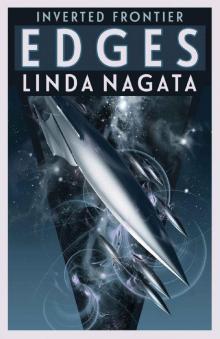 Edges
Edges The Red
The Red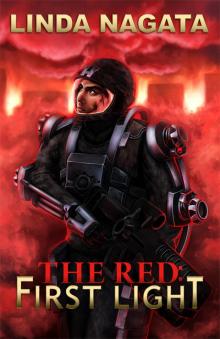 The Red: First Light
The Red: First Light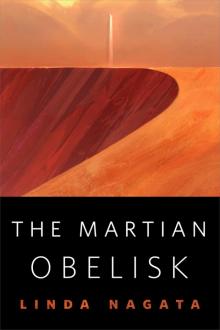 The Martian Obelisk
The Martian Obelisk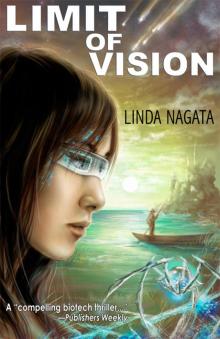 Limit of Vision
Limit of Vision Going Dark
Going Dark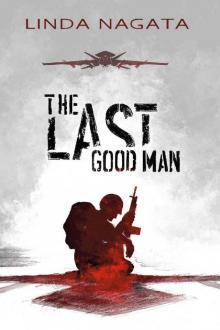 The Last Good Man
The Last Good Man The Trials (The Red Trilogy Book 2)
The Trials (The Red Trilogy Book 2)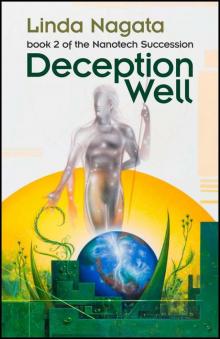 Deception Well (The Nanotech Succession Book 2)
Deception Well (The Nanotech Succession Book 2)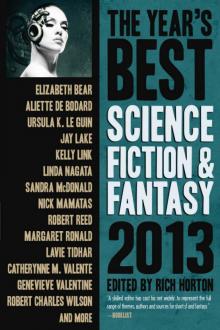 The Year's Best Science Fiction & Fantasy 2013
The Year's Best Science Fiction & Fantasy 2013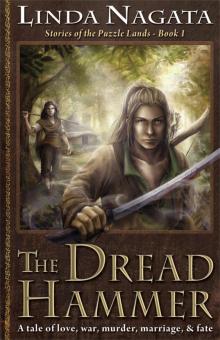 The Dread Hammer
The Dread Hammer Skye Object 3270a
Skye Object 3270a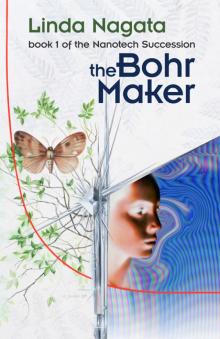 The Bohr Maker
The Bohr Maker